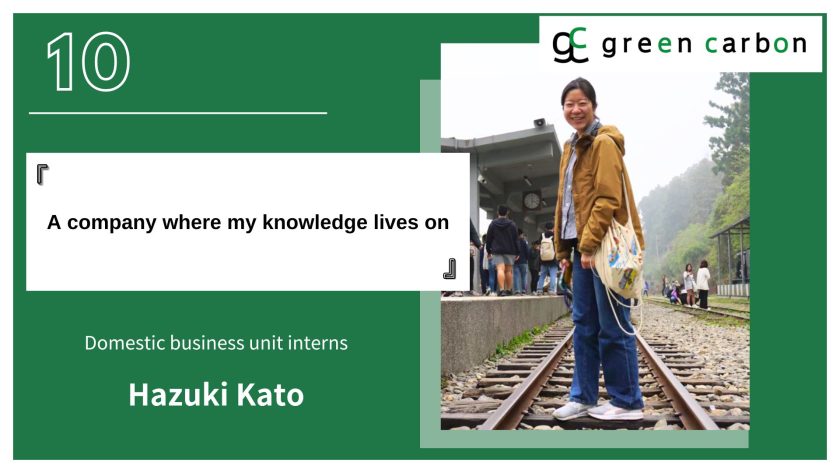We interviewed Hazuki Kato, who works for GreenCarbon as an intern. Please read to the end!
Q.Please give a brief introduction about yourself, including your school life so far.
After graduating from the Faculty of Forest and Resource Economics in the Department of Bioresources at the University of Tsukuba, I studied for a master’s degree at both the University of Tsukuba and Taiwan University, and then went to Taiwan for a year. From an early age, I have always loved nature, especially forests. When I was a high school student, I read books on forestry in Europe and wanted to deepen my study of forests and forestry, so I entered the Forest Resource Economics Laboratory at the University of Tsukuba, where I went on to study.
During my master’s course, I analysed the differences between the current forest law system (safety forest system) in Japan and Taiwan, which has similar forest law roots due to Japanese rule. I like foreign countries, especially Central Asia. One day I would like to travel by horse on the steppes.
Q.What made you decide to work for Green Carbon?
During my job search, I felt that there were no positions where I could utilise what I wanted to do and what I had learned. In the course of my research, I found Greencarbon Corporation.
There was no form for recruiting new graduates, so I emailed the company and asked, ‘Do you recruit new graduates?’ I was hired as an intern. I was hired as an intern and will be joining the company in the future.
Q.What type of work are you involved in? And what makes your job worthwhile?
I work on forest-related credits, both nationally and internationally.
The rewarding part is being able to use my knowledge of forestry and being deeply involved in and learning from the booming industry of nature-based carbon credits.
I am most excited when I realise that I am gaining knowledge that is not found in textbooks and that I can put it to use in practice.
Q.Finally, do you have a message for people who want to work for GreenCarbon?
In the still unexplored world of carbon credits, we feel that the development and dissemination of carbon credits requires knowledge and experience in a variety of fields, both in the humanities and sciences.
If you want to contribute to environmental protection but don’t know where you can use your knowledge, perhaps you can find a place to demonstrate it in Green Carbon’s work.

